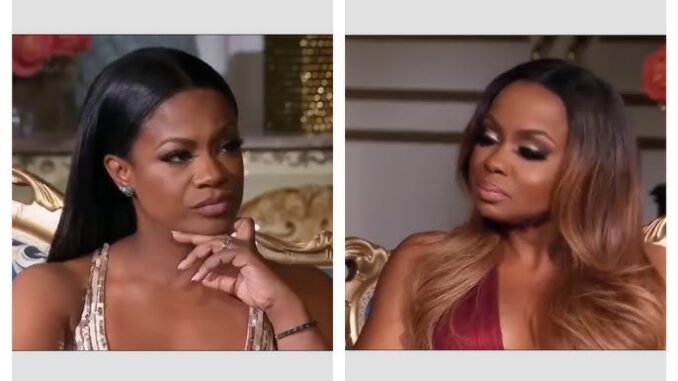
In the often-cacophonous symphony of reality television, where drama is currency and feuds are forged for entertainment, certain moments transcend mere theatrics to become truly seismic. The Real Housewives of Atlanta, a series celebrated for its larger-than-life personalities and explosive confrontations, has had its share of jaw-dropping revelations. Yet, none reverberated with the chilling impact of the truth unveiled in the Season 9 finale reunion: the deliberate fabrication and dissemination of a heinous accusation by Phaedra Parks against Kandi Burruss, a revelation that exposed the dark underbelly of reality television and the chilling potential for betrayal.
The season had been shadowed by a deeply disturbing rumor, whispered by Porsha Williams, that Kandi Burruss and her husband, Todd Tucker, had attempted to drug and sexually assault Porsha. The accusation, weighty and criminal in its implications, hung heavy over the cast, creating palpable discomfort and a clear divide. Kandi vehemently denied the claims, her tears and genuine outrage speaking to the gravity of the slander. Porsha, meanwhile, maintained she had heard the story from a reliable source, though she remained evasive about its origins, inadvertently fueling the speculation that often characterizes RHOA's narrative arcs.
The stage for the ultimate reveal was set during the multi-part reunion, a notoriously intense crucible where past grievances are aired and secrets are forced into the harsh glare of the spotlight. As host Andy Cohen meticulously probed the details of the allegation, the tension in the room became almost unbearable. Kandi, her voice trembling with a mixture of anger and desperation, pressed Porsha to reveal her source. The silence that followed was deafening, pregnant with anticipation, until Porsha, cornered and clearly distraught, finally cracked. With a tear-streaked face and a voice barely above a whisper, she uttered the name that sent a collective gasp through the cast and audience alike: "Phaedra."
The revelation was instantaneous and devastating. Not merely a casual gossip or an exaggerated slight, this was an accusation of attempted sexual assault – a claim so morally reprehensible that it crossed the line from reality TV theatrics into potentially criminal territory. The camera lingered on the stunned faces of the other housewives – Cynthia Bailey's disbelief, Kenya Moore's vindicated stare, Shereé Whitfield's stunned silence – but it was Kandi’s reaction that was most telling. Her initial shock quickly transformed into a grim, almost heartbreaking validation of her truth, mixed with an unfathomable depth of hurt that someone she once considered a friend could betray her so maliciously. Phaedra Parks, the polished attorney and "Southern Belle" known for her composed demeanor, sat almost impassively, offering only a vague, half-hearted apology that rang hollow in the face of such a calculated deception.
The true shock of this revelation was multi-faceted. Firstly, it wasn't just a lie; it was a manufactured lie of extreme gravity, designed to cause maximum damage. For years, viewers had watched housewives fling insults, accuse each other of infidelity, or engage in petty slights. But this went beyond the typical scope of reality television villainy. It suggested a premeditated desire to destroy Kandi’s reputation and possibly her career, using one of the most serious accusations imaginable.
Secondly, the source of the lie amplified the shock. Phaedra Parks had cultivated an image of grace, intelligence, and unwavering loyalty to her friends, particularly Kandi. Their shared history spanned years, from early seasons where Kandi provided unwavering support during Phaedra's marital troubles. To learn that such a deeply malicious scheme originated from a supposed friend, one who held a professional ethical code as an attorney, was a profound betrayal that resonated beyond the screens. It exposed a calculating, dark side to Phaedra that many viewers, and even some cast members, had perhaps subconsciously refused to believe existed.
Finally, the incident revealed the terrifying vulnerability of individuals on reality television. Porsha Williams, herself a victim of Phaedra's manipulation, was unwittingly used as a pawn in a larger, darker game. The ease with which such a destructive narrative could be created and disseminated, even by someone within a tight-knit friend group, served as a chilling cautionary tale about the blurred lines between personal lives and public personas, and the cutthroat nature of maintaining relevance in an unforgiving industry.
The fallout from the Season 9 finale was immediate and decisive. Phaedra Parks was not invited back for subsequent seasons, a rare and definitive consequence for a housewife, underscoring the severity of her actions. The friendships within the group were irrevocably fractured, and the moral compass of the show seemed to shift, having witnessed the depths to which one could sink for personal gain.
In conclusion, the most shocking truth revealed in the RHOA Season 9 finale reunion was not just that a lie had been told, but the chilling realization of its deliberate, malicious fabrication by Phaedra Parks. It transcended the usual drama, pulling back the curtain to expose the potentially destructive power of unchecked ambition, the profound betrayal of trust, and the moral abyss that can lie beneath even the most polished of veneers in the high-stakes world of reality television. It remains a watershed moment, a stark reminder that sometimes, the most shocking truths are the ones that shatter not just friendships, but our very perception of human integrity.